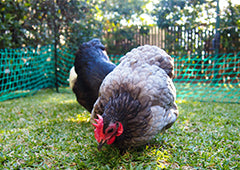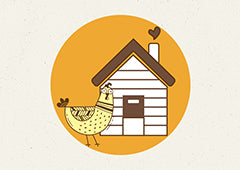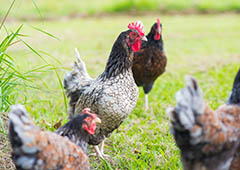Occasionally, our chickens pick up some nasty habits. Some mainly cause a nuisance, like egg-eating, whilst others can result serious damage to your flocks health if left unattended. If your chickens have started acting out and its having an impact on their quality of life, it is important to encourage them to rectify their behaviour.
Here's some common chicken habits and remedies for bad behaviour.
Laying eggs on the floor
Laying eggs on the floor instead of the nesting is a common problem that is particularly found in young hens. Sometimes, if there are no older hens to teach them the right habits, the young hens will lay their eggs in inappropriate places.
Why is it important to stop:
- It’s important to break this habit because if eggs are rolling around on the floor unattended, they are at risk of being crushed. This can lead to inquisitive chickens pecking the eggs, which can cause egg eating...you get the idea.
- The more hens lay eggs on the floor, the more the other hens will think this is normal behaviour - and copy it.
How to break the habit
- Ensure there are enough nesting boxes for your flock - as a guide, we would recommend that there should be one box for every 3-4 hens. This is because the hens share nesting boxes, and don’t all lay eggs at the same time.
- Collect all floor eggs quickly so the other hens do not see them
- Place fake eggs into the nesting boxes to show the hens the right place to lay

Egg-eating
Egg-eating is one of the most annoying habits a chicken can develop. Before you have the chance to get your hands on the eggs, your flock have already devoured your precious produce.
Why is it important to stop:
- You won’t get your fresh eggs for breakfast every morning!
- Its contagious behaviour - other members of the flock will copy an egg-eating hen.
- They won’t just eat their own eggs - they’ll eat any eggs they can get their beak on, laid by other hens.
How to break the habit:
Unfortunately, there are no miracle cures for egg-eating hens. Some of these methods may break the habit, but most work best as preventions.
- Have adequate nesting space for all chickens.
- Consistently collect all freshly laid eggs promptly.
- Ensure your chickens are receiving enough protein and calcium in their diets - add shell grit if you haven’t already.
- Put ‘fake’ eggs into their coop and nesting boxes, such as golf balls or plastic eggs, so they peck at those instead!
- Remove the offending bird from the flock and put it into a temporary, secure enclosure whilst the rest of the flock are laying their eggs.
For more on egg eating, check out our ‘Top Tips to Stop Your Chickens From Eating Their Eggs’ article.
Roosting on the floor
Chickens sleeping on the floor instead of their perch may not seem like such a bad habit, but it can cause them a lot of health problems if they persist. The perch is a much better option!
Why is it important to stop:
- Roosting on the floor means they will be sleeping in close proximity to the bedding - which may contain droppings if it hasn’t been changed over recently. The ammonia fumes from the droppings can cause your floor roosting flock to have respiratory problems.
- This can also cause other health problems like swollen joints and feather loss
How to break the habit:
- Encourage the birds to roost on the perch by gently lifting them up onto it when the sun has gone down. Often they will simply jump back off - but keep trying! It may take a few days for them to adopt the behaviour. If you’ve got a Backyard Chicken Coops coop, try removing the cleaning tray before lifting the chickens up onto the perch. Or, lower the perches closer to the ground.
Check out our Chickens Refusing to Roost article for more information on stopping this behaviour.
Bullying
Sometimes hens can be a little frosty towards one another. It’s actually very natural - the pecking order is something that all flocks develop. However, if some of your chickens are being a bit too rough and seriously injuring one another, or being excluded completely here are steps you can take to try and reduce the severity.
Why it is important to stop:
- If a chicken is wounded, this can cause the other chickens to continue pecking more severely - putting your chickens’ lives at risk.
- An excluded hen may have extremely limited access to food and water, because the other flock members will not let them near it. This means they may become malnourished.
How to break the habit:
- If the situation is severe, split the flock into two groups. This will cause them to re-order, which hopefully will help the hen at the bottom of the pecking order.
- Remove any injured birds from the flock and treat their wounds as soon as possible. This also allows them some time to recuperate and de-stress.
- Have two sets of feeders and waterers so the excluded hen has a better opportunity to get their nutrients
Chickens pecking each others feathers
Chickens pecking at the feathers of other hens in their flock can lead to serious health problems if the habit isn’t stopped.
Why is it important to stop:
- The sight of blood can cause other chickens to peck at the wound and make it worse.
- Letting the behaviour continue often means it will get worse, and the chicken can be severely injured
How to break the habit:
- Isolate the chicken who has the wound or lost feathers, until they have recovered.
- Keep your chickens amused - sometimes they will peck each others feathers out of boredom. Check out our The Best Boredom Busters To keep Your Chickens Busy! article for ways to entertain your flock.
Like humans, most bad behaviours can be corrected if managed effectively. Different levels of severity call for different actions - for example, some pecking is normal, and only really bad if it is causing stress or harm to their fellow chicken.
One great way to encourage good behaviour is by having a spacious coop with all the necessary features - enough nesting boxes, good perches and decent space so they don’t get bored as easily. All of our coops are fitted with these features - so your chickens should be on their best behaviour!
Although some behaviours are cute quirks for a breed, others may be a cause for concern! Like all pets, chickens can be trained to break bad habits and reinforce positive ones.
Cluckily, our friends over at Chickenpedia have created an amazing Chicken Etiquette Course. This extensive online course shares useful advice on a variety of chicken behaviours. The well-structured course will also help you deal with bad behaviour and encourage positive behaviours. Keep the neighbours happy - their only complaint will be that they wish they also had chickens!
Learn how to have the best-behaved chickens in town with this beginner-friendly course. This is why I highly recommend Chickenpedia’s courses to all of my readers! They are filled with vital information that help you raise a happy, healthy flock.
Click here to check out Chickenpedia today!


















